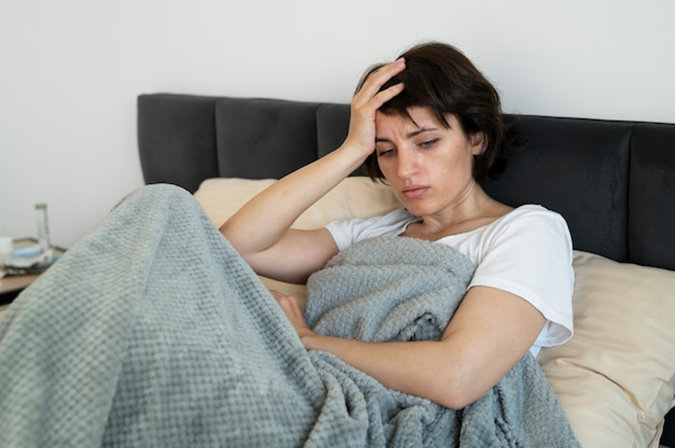Polycystic Ovary Syndrome (PCOS), a complex hormonal disorder occurs in millions of women worldwide. It is characterized by various symptoms and imbalances that can significantly impact a woman’s reproductive health, physical well-being, and emotional state.

Women with PCOS disease often experience irregular menstrual cycles, with some going several months without a period. This absence of menstruation, known as amenorrhea, can be distressing and raise concerns about fertility and overall health.
“PCOS is a condition that demands attention and understanding, as it can have far-reaching consequences on various aspects of a woman’s life,” says Dr. Himali Maniar.
Are you living with PCOS with regular periods and no symptoms? Please visit Dr. Maniar, the best gynecologist in South Bopal, Ahmedabad, known for exceptional care and expertise in women’s health needs.
Is it normal to not have periods for a year with PCOS?
PCOS disrupts hormonal balance, leading to irregular or absent menstrual cycles. The prolonged absence of periods can impact fertility and overall health. Experiencing irregular periods is common among women with Polycystic Ovary Syndrome (PCOS). However, the absence of menstruation for a year is not typical and requires attention from a healthcare professional.
Seeking guidance from a gynecologist or endocrinologist is crucial to identify the root causes and determine the appropriate PCOS treatment.
Late periods in PCOS – Cause
“PCOS is rooted in the endocrine system, where an imbalance in hormone levels disrupts the normal functioning of the ovaries,” explains Dr. Himali Maniar, lady gynecologist in Bopal, Ahmedabad. “Late periods or irregular menstrual cycles are a hallmark of PCOS.”

Some common factors include:
Hormonal Imbalance:
PCOS disrupts the normal hormonal balance in the body, particularly involving the levels of luteinizing hormone (LH), follicle-stimulating hormone (FSH), androgens (such as testosterone), and insulin. These imbalances interfere with the normal development and release of eggs from the ovaries (ovulation), causing anovulation, leading to irregular or delayed periods.
Insulin Resistance:
Many women with PCOS no period for years also experience insulin resistance, which means their body has difficulty using insulin effectively. Insulin resistance can impact hormone regulation and contribute to irregular periods.
Obesity:
Excess body weight or obesity is often associated with PCOS and can exacerbate hormonal imbalances. It can contribute to irregular menstrual cycles or the absence of periods altogether.
Please consult the highly-skilled gynecologist Dr. Himali Maniar to determine the causes of late periods and develop an appropriate treatment plan.
Potential Consequences of No Period for 1 Year
The absence of a menstrual period for a year, known as amenorrhea, can have potential consequences, including:
- Hormonal imbalances: Prolonged absence of periods indicate hormonal imbalances, affecting overall well-being.
- Reduced fertility: No periods for a year suggest anovulation, making conception challenging.
- Increased risk of endometrial issues: Lack of regular shedding increases the risk of endometrial hyperplasia or cancer.
- Bone density loss: The absence of periods leads to decreased estrogen levels, potentially causing bone density loss.
- Psychological distress: Emotional impact includes anxiety, stress, and concerns about health and fertility. Seeking medical guidance is crucial.

PCOS symptoms and severity vary, with menstrual irregularities being a standard feature. Other symptoms include hirsutism (excessive hair growth), acne, weight gain, and insulin resistance. PCOS also raises the risk of developing type 2 diabetes, high blood pressure, and cardiovascular disease.
“We must not underestimate the emotional toll of PCOS either,” advises Ahmedabad’s well-known gynecologist Dr. Himali Maniar. “Many women with the condition often struggle with anxiety, depression, and body image issues.”
Treatment options to restore regular menstrual cycles
Treatment options for restoring regular menstrual cycles in PCOS include:
Lifestyle changes:
Adopting a healthy lifestyle with a balanced diet, exercise, stress management, and adequate sleep. Increase consumption of foods with anti-inflammatory properties.

Weight management:
Losing weight if overweight or obese to improve hormonal balance and menstrual regularity.
Hormonal birth control:
Using oral contraceptives or other hormonal methods to regulate menstrual cycles.
Progestin therapy:
Taking progestin induces withdrawal bleeding and restarts the menstrual cycle.
Fertility medications:
Using medications like clomiphene citrate or letrozole to stimulate ovulation and restore regular periods.

Anti-androgen medications:
Take medications to reduce androgen levels and manage symptoms like hirsutism and acne.
Insulin-sensitizing medications:
Using metformin improves insulin sensitivity and restores menstrual regularity.
If you have missed your periods for several months, please do not delay in consulting healthcare professional Dr. Himali Maniar to determine the most suitable treatment approach for your needs.
Conclusion

Navigating through the challenges of PCOS and experiencing no periods for an entire year can be a distressing journey for women. Understanding the causes, potential consequences, and available treatment options is crucial for managing this condition effectively. If you find yourself in this situation, seeking guidance from a knowledgeable and experienced healthcare professional is paramount.
Please visit Dr. Himali Maniar, the best gynecologist in South Bopal, Ahmedabad, for comprehensive care, personalized solutions, and the expertise needed to address your concerns.
Remember, you are not alone in this journey. With the proper support and medical care, it is possible to restore regular menstrual cycles, manage PCOS symptoms, and reclaim control over your reproductive health and overall well-being.
FAQs
Q.1 Is PCOS curable permanently?
A: PCOS is not curable permanently, but a gynecologist can effectively help you manage its symptoms and effects.
Q.2 Can PCOS-related absence of periods be treated successfully?
A: Yes, the treatment of PCOS-related absence of periods can often be successful in restoring regular menstrual cycles.
Q.3 Should I be concerned about my fertility if I have PCOS and no period for a year?
A: Concerns about fertility are valid if you haven’t had a period for 1 year due to PCOS, please consult a healthcare professional.
Q.4 How long should I wait before seeking medical help if I haven’t had a period for 1 year with PCOS?
A: If you haven’t had a period for 1 year with PCOS, it is advisable to seek medical help promptly to evaluate the underlying causes and develop a suitable treatment plan.
Q.5 Can weight loss help restore regular periods if I have no periods due to PCOS?
A: Weight loss can help improve hormonal balance and restore regular periods in cases of PCOS-related absence of periods, but individual results may vary.
Q.6 At what age does PCOS start?
A: It mostly happens at any age after puberty, most women find that they have PCOS in their 20s and 30s.
Q.7 How can I get my period back with PCOS?
A: By following the below methods one can get periods back:
- Exercising Regularly
- Balanced diet
- Vitamins supplements
- Maintaining healthy weight

